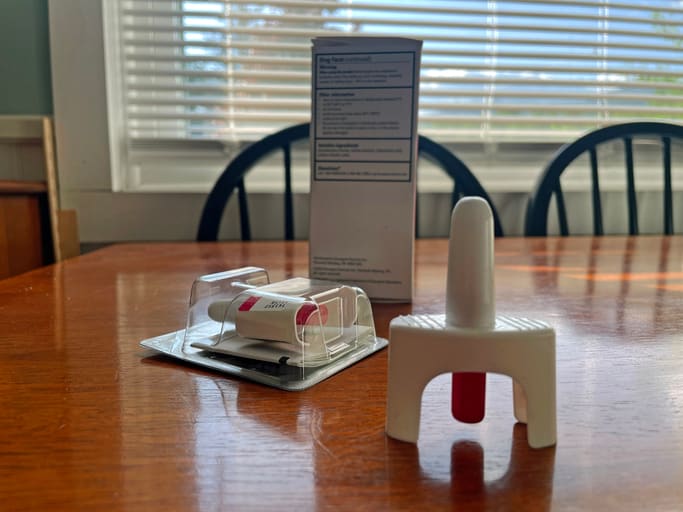This information is not intended as a substitute for professional medical care. Always follow your health care professional’s instructions.
Magnesium magic: myth or reality?
[4 min read]
In this article:
- Social media is full of health and wellness trends. Not all of them are medically sound or beneficial.
- Magnesium supplements are among the latest cure-alls recommended by online fitness influencers.
- We asked a Swedish primary care expert to weigh in on the magnesium craze.
If you spend any time on social media, you’ve likely seen the firehose of videos offering health and fitness advice. Influencers push all kinds of serums, powders and supplements, guaranteeing their support for optimal health and well-being. The latest fave among the social media set is the magical mineral magnesium. More than a few influencers — many of them M.D.s — are on the magnesium train, claiming it cures everything from insomnia to digestive issues. To get the skinny on magnesium, we spoke to Providence Swedish First Hill and System Chief of Medicine and Primary Care Regional Medical Director, Peter C. Olson, M.D., a primary care and internal medicine expert here at Swedish.
What is magnesium? Why is it important?
Magnesium is a mineral that is an essential nutrient for your body. We need it for our systems to function properly and it supports countless functions that keep us alive. In general, the amount recommended by The U.S. National Institutes of Health is 310 to 400 milligrams a day for an adult. That can change depending on health or if someone is pregnant, for example. But magnesium occurs in many of the foods we eat, such as dark chocolate, avocados, peanut butter, pumpkin seeds, tofu, etc., so if you eat a diverse and balanced diet, you probably don’t need to supplement your magnesium intake; you’re getting what you need from your food.
In our society, people are always looking for ways to feel better and healthier. They want to know how they can do it and what they’re missing that might help with that goal. These trends make it seem so easy. They look like a miracle drug to fix X, Y or Z problem. The idea of a panacea is very inviting, but the truth is there are no quick fixes.
Is magnesium the cure-all we see online?
The short answer is no. Magnesium is not a replacement for treatment or medication for anxiety disorders, insomnia or other conditions it is reported to cure. The evidence for magnesium improving anxiety or sleep is weak, although there is some data suggesting it can help with other things. Some forms have been shown to help with muscle relaxation and minimize migraines.
It’s important to talk to your doctor before starting any supplementation, especially if you have a health condition or you’re taking prescription medication. It’s very different if you’re taking something for supplementation versus medical reasons — there is a whole different approach. I want to emphasize that if you eat a healthy, balanced diet, you are probably getting the appropriate amount of magnesium and do not need supplementation. Magnesium deficiency is actually pretty rare.
Is there any reason to be cautious about magnesium?
It’s something you should be talking to your doctor about. It may not be safe for everyone. As I mentioned, pregnant people should be cautious and talk to their OB and their family or primary care doctor about adding any sort of supplementation; nutritional needs can change.
You also need to look at the word after magnesium on the label, there are many forms which can be used for many different treatments as medication. Too much magnesium can lead to muscle cramps and diarrhea.
Why do you think people respond so strongly to these trends?
In our society, people are always looking for ways to feel better and healthier. They want to know how they can do it and what they’re missing that might help with that goal. These trends make it seem so easy. They look like a miracle drug to fix X, Y or Z problem. The idea of a panacea is very inviting, but the truth is there are no quick fixes.
How should we approach online health trends and advice?
Carefully. It’s not a replacement for talking with your health-care practitioner. In the case of magnesium, we should remember that there is a whole, unregulated supplement industry that is a multibillion-dollar business. Their products don’t necessarily do what they say they do, and they don’t necessarily contain what they say they contain. It’s a lucrative industry that is often not regulated by the U.S. Food and Drug Administration the way pharmaceuticals and their claims don’t necessarily have to be backed up by reality.
Learn more and find a practitioner
Whether you require an in-person visit or want to consult a doctor virtually, you have options. Contact Swedish Primary Care to schedule an appointment with a primary care provider. You can also connect virtually with your clinician to review your symptoms, provide instruction and follow up as needed. And with Swedish ExpressCare Virtual you can receive treatment in minutes for common conditions such as colds, flu, urinary tract infections, and more. You can use our provider directory to find a specialist or primary care physician near you.
Information for patients and visitors
Additional resources
New year, new-trition. Get 2024 off to a healthy start.
After his family’s tragedy, a Swedish caregiver logs miles to save lives
The best time to find a primary care practitioner is when you don’t need one
Swedish’s medical weight loss program offers more options for a healthier future




